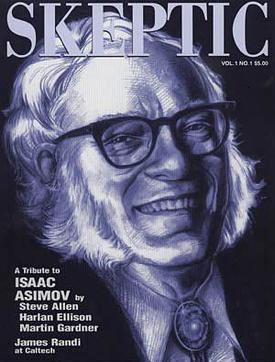A skeptic is one who practices skepticism.
Contents
Skeptic or Sceptic may also refer to:
A skeptic is one who practices skepticism.
Skeptic or Sceptic may also refer to:
Skepticism, also spelled scepticism in British English, is a questioning attitude or doubt toward knowledge claims that are seen as mere belief or dogma. For example, if a person is skeptical about claims made by their government about an ongoing war then the person doubts that these claims are accurate. In such cases, skeptics normally recommend not disbelief but suspension of belief, i.e. maintaining a neutral attitude that neither affirms nor denies the claim. This attitude is often motivated by the impression that the available evidence is insufficient to support the claim. Formally, skepticism is a topic of interest in philosophy, particularly epistemology.

The Skeptic's Dictionary is a collection of cross-referenced skeptical essays by Robert Todd Carroll, published on his website skepdic.com and in a printed book. The skepdic.com site was launched in 1994 and the book was published in 2003 with nearly 400 entries. As of January 2011 the website has over 700 entries. A comprehensive single-volume guides to skeptical information on pseudoscientific, paranormal, and occult topics, the bibliography contains some seven hundred references for more detailed information. According to the back cover of the book, the on-line version receives approximately 500,000 hits per month.

The Committee for Skeptical Inquiry (CSI), formerly known as the Committee for the Scientific Investigation of Claims of the Paranormal (CSICOP), is a program within the U.S. non-profit organization Center for Inquiry (CFI), which seeks to "promote scientific inquiry, critical investigation, and the use of reason in examining controversial and extraordinary claims." Paul Kurtz proposed the establishment of CSICOP in 1976 as an independent non-profit organization, to counter what he regarded as an uncritical acceptance of, and support for, paranormal claims by both the media and society in general. Its philosophical position is one of scientific skepticism. CSI's fellows have included notable scientists, Nobel laureates, philosophers, psychologists, educators, and authors. It is headquartered in Amherst, New York.
Skeptical Inquirer is a bimonthly American general-audience magazine published by the Committee for Skeptical Inquiry (CSI) with the subtitle: The Magazine for Science and Reason.

Scientific skepticism or rational skepticism, sometimes referred to as skeptical inquiry, is a position in which one questions the veracity of claims lacking empirical evidence. In practice, the term most commonly references the examination of claims and theories that appear to be beyond mainstream science, rather than the routine discussions and challenges among scientists. Scientific skepticism differs from philosophical skepticism, which questions humans' ability to claim any knowledge about the nature of the world and how they perceive it, and the similar but distinct methodological skepticism, which is a systematic process of being skeptical about the truth of one's beliefs.
The Skeptics Society is a nonprofit, member-supported organization devoted to promoting scientific skepticism and resisting the spread of pseudoscience, superstition, and irrational beliefs. The Skeptics Society was co-founded by Michael Shermer and Pat Linse as a Los Angeles-area skeptical group to replace the defunct Southern California Skeptics. After the success of its magazine, Skeptic, introduced in early 1992, it became a national and then international organization. The stated mission of Skeptics Society and Skeptic magazine "is the investigation of science and pseudoscience controversies, and the promotion of critical thinking."

Skeptic, colloquially known as Skeptic magazine, is a quarterly science education and science advocacy magazine published internationally by The Skeptics Society, a nonprofit organization devoted to promoting scientific skepticism and resisting the spread of pseudoscience, superstition, and irrational beliefs. First published in 1992, the magazine had a circulation of over 40,000 subscribers in 2000.

Robert Todd Carroll was an American author, philosopher and academic, best known for The Skeptic's Dictionary. He described himself as a naturalist, an atheist, a materialist, a metaphysical libertarian, and a positivist. In 2010 he was elected a fellow of the Committee for Skeptical Inquiry. He was a professor of philosophy at Sacramento City College from 1977 until his retirement in 2007.

Skepticality is the official podcast of The Skeptics Society's Skeptic magazine. Beginning in May 2005, the podcast explores rational thought, skeptical ideas, and famous myths from around the world and throughout history. Each episode is an audio magazine featuring regular segments by contributors who are specialized in specific areas of critical thought followed by featured content which is usually in the form of an interview with a researcher, author, or individual who is helping promote skeptical thought and/or science in an effective way. It has featured interviews with James Randi, and scientists, such as authors and astronomers Phil Plait and Neil deGrasse Tyson, Greg Graffin from Bad Religion, Adam Savage from the MythBusters, songwriter Jill Sobule, author Ann Druyan and science communicator Bill Nye.

The Amazing Meeting (TAM), stylized as The Amaz!ng Meeting, was an annual conference that focused on science, skepticism, and critical thinking; it was held for twelve years. The conference started in 2003 and was sponsored by the James Randi Educational Foundation (JREF). Perennial speakers included Penn & Teller, Phil Plait, Michael Shermer and James "The Amazing" Randi. Speakers at the four-day conference were selected from a variety of disciplines including scientific educators, magicians, and community activists. Outside the plenary sessions the conference included workshops, additional panel discussions, music and magic performances and live taping of podcasts including The Skeptics' Guide to the Universe. The final Amazing Meeting was held in July 2015.
Daniel Loxton is a Canadian writer, illustrator, and skeptic. He that wrote or co-wrote several books including Tales of Prehistoric Life, a children's science trilogy, and Abominable Science!. As editor of Junior Skeptic, Loxton writes and illustrates most issues of Junior Skeptic, a children's science section in the Skeptics Society's Skeptic magazine.

Skeptics in the Pub is an informal social event designed to promote fellowship and social networking among skeptics, critical thinkers, freethinkers, rationalists and other like-minded individuals. It provides an opportunity for skeptics to talk, share ideas and have fun in a casual atmosphere, and discuss whatever topical issues come to mind, while promoting skepticism, science, and rationality.

Kylie Sturgess is a past President of the Atheist Foundation of Australia, an award-winning blogger, author and independent podcast host of The Token Skeptic Podcast. A Philosophy and Religious Education teacher with over ten years experience in education, Sturgess has lectured on teaching critical thinking, feminism, new media and anomalistic beliefs worldwide. She is a Member of the James Randi Educational Foundation (JREF) Education Advisory Panel and regularly writes editorial for numerous publications, and has spoken at The Amazing Meeting Las Vegas, Dragon*Con (US), QED Con (UK). She was a presenter and Master of Ceremonies for the 2010 Global Atheist Convention and returned to the role in 2012. Her most recent book The Scope of Skepticism was released in 2012. She is a presenter at Perth's community radio station RTRFM, and a winner at the 2018 CBAA Community Radio Awards in the category of Talks, with the show Talk the Talk In 2020 she was in the final eight in the Three-Minute Thesis (3MT) Asia-Pacific virtual showcase.

Desiree Schell is the host of the live Canadian call-in radio talk show and podcast, "Science for the People". An advocate for scientific skepticism, Schell is a strong advocate of critical thinking and is strongly interested in the promotion of skepticism publicly. In her work as a labour organizer Schell creates curricula and teaches courses on effective activism, drawing on the experience of other social movements.

Karen Stollznow is an Australian-American author, linguist, public speaker, and podcaster. Her books include Missed Conceptions: How We Make Sense of Infertility, On the Offensive: Prejudice in Language Past and Present, The Language of Discrimination, God Bless America: Strange and Unusual Religious Beliefs and Practices in the United States, Haunting America, Language Myths, Mysteries and Magic, Hits and Mrs, and Would You Believe It?: Mysterious Tales From People You'd Least Expect. Stollznow also writes short fiction, including the title Fisher's Ghost and Other Stories, and she is a host on the podcast Monster Talk with Blake Smith. She has written for many popular publications, including The Conversation and Psychology Today. Stollznow has also appeared as an expert on many TV shows, including A Current Affair and the History Channel's History's Greatest Mysteries.

The Young Australian Skeptics (YAS) is an Australian skeptical organisation whose primary focus is its collaborative blog, which attempts to address topics central to science, critical thinking and scientific skepticism. The group has published a Skeptical Blog Anthology Book reviewed in Scientific American, and has been represented in national broadcast media in Australia and North America, skeptically addressing conspiracy theories, as well as discussing topics specific to young members of the skeptical movement.

Edinburgh Skeptics is a nonprofit organisation that promotes science, reason and critical thinking in Edinburgh and throughout Scotland. It was founded in 2009. The Society hosts regular social and educational events in Edinburgh and has campaigned against the use of homeopathy and challenged claims of ghost sightings.
QED: Question, Explore, Discover is an annual skeptical conference held in Manchester, England. QED is organised by North West Skeptical Events Ltd (NWSE), a volunteer-owned non-profit organisation originating from a collaboration between the Merseyside Skeptics Society and the Greater Manchester Skeptics Society.